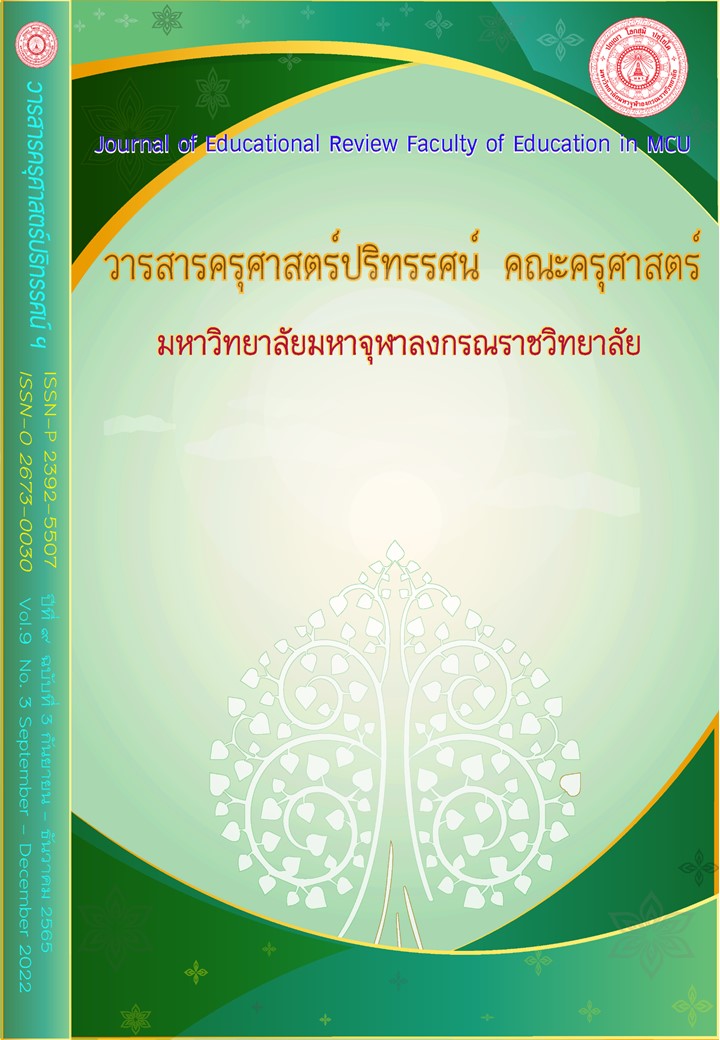THE PRIORITY NEEDS OF ACADEMIC MANAGEMENT OF SECONDARY SCHOOLS IN LOEI PROVINCE BASED ON THE CONCEPT OF PERSONALIZED LEARNING
Main Article Content
Abstract
The purposes of this research were 1) to study the actual state and the desirable state of academic management of secondary schools in Loei province based on the concept of personalized learning and 2) to analyze the priority needs of academic management of secondary schools in Loei province based on the concept of personalized learning. The population of the research were 4 secondary schools in Loei province consisted of Loeipittayakom school Chiangkhan school Princess Chulabhorn Science High School Loei and Srisongkram school. The Informants consisted of 32 people using the tables of Krejcie and Morgan. The research instrument in this study was the 5 - point rating scaled questionnaire of the actual state and the desirable state of academic management of secondary schools in Loei province based on the concept of personalized learning. The data were analyzed by frequency distribution, percentage, mean, standard deviation and modified priority needs index. The research findings indicated that, overall, the actual state was at the middle level and was sorted from the highest to the lowest as follows: the development of media innovation and educational technology, the curriculum development respectively, the learning process development and the measurement and evaluation. The desirable state was, overall, at the high level and was sorted from the highest to the lowest as follows: the learning process development, the development of media innovation and educational technology, the curriculum development respectively and the measurement and evaluation. The result of priority need analysis turned out that the first priority need fell on the measurement and evaluation, followed by the learning process development, curriculum development and development of media innovation and educational technology, respectively.
Article Details

This work is licensed under a Creative Commons Attribution-NonCommercial-NoDerivatives 4.0 International License.
ทัศนะและความคิดเห็นที่ปรากฏในบทความในวารสารฉบับนี้ถือเป็นความรับผิดชอบของผู้เขียนบทความนั้นเพียงผู้เดียว และไม่ถือเป็นทัศนะและความรับผิดชอบของกองบรรณาธิการ
กองบรรณาธิการขอสงวนสิทธิ์ในการคัดเลือกบทความลงตีพิมพ์และจะแจ้งให้เจ้าของบทความทราบหลังจากผู้ประเมินบทความตรวจอ่านบทความแล้ว
ต้นฉบับที่ได้รับการตีพิมพ์ในวารสารครุศาสตร์ปริทรรศน์ คณะครุศาสตร์ มหาวิทยาลัยมหาจุฬาลงกรณราชวิทยาลัย ถือเป็นกรรมสิทธิ์ของคณะครุศาสตร์ มหาวิทยาลัยมหาจุฬาลงกรณราชวิทยาลัย ห้ามนำข้อความทั้งหมดหรือบางส่วนไปพิมพ์ซ้ำ เว้นเสียแต่ว่าจะได้รับอนุญาตจากมหาวิทยาลัยฯ เป็นลายลักษณ์อักษร
References
กระทรวงศึกษาธิการ. (2545). พระราชบัญญัติการศึกษาแห่งชาติ พุทธศักราช 2542 (ฉบับที่ 2) และที่แก้ไขเพิ่มเติม พุทธศักราช 2545. กรุงเทพมหานคร: สยามสปอรต์ซินดิเค.
กระทรวงศึกษาธิการ. (2559). แผนพัฒนาการศึกษาของกระทรวงศึกษาธิการ ฉบับที่ 12 (พ.ศ. 2560 - 2564). แหล่งที่มา http://www.bpp.mua.go.th/main/download/plan/EducationPlan12.pdf สืบค้นเมื่อ 13 ธ.ค. 2563.
ปริญา ปริพุฒ และธูปทอง กว้างสวาสดิ์. (2561). ผลการใช้รูปแบบการเรียนรู้ส่วนบุคคลบนพื้นฐานการเล่นเพื่อส่งเสริมความสามารถในการสะท้อนผลการปฏิบัติภาระงาน. วารสารราชพฤกษ์. 15(2). 53-62.
ปริยาภรณ์ ตั้งคุณานันท์. (2562). การบริหารงานวิชาการในสถานศึกษาเพื่อการพัฒนาที่ยั่งยืน. กรุงเทพมหานคร: โรงพิมพ์แห่งจุฬาลงกรณ์มหาวิทยาลัย.
รุ่งชัชดาพร เวหะชาติ. (2550). การบริหารงานวิชาการสถานศึกษาขั้นพื้นฐาน. กรุงเทพมหานคร: ศูนย์หนังสือมหาวิทยาลัยทักษิณ.
วิชัย วงษ์ใหญ่ และมารุต พัฒผล. (2561). การเรียนรู้ส่วนบุคคล Personalized Learning. กรุงเทพมหานคร:จรัลสนิทวงศ์การพิมพ์.
วิชัย วงษ์ใหญ่ และมารุต พัฒผล. (2561). ขอบฟ้าใหม่แห่งการเรียนรู้สู่การสร้างสรรค์อนาคต. กรุงเทพมหานคร: จรัลสนิทวงศ์การพิมพ์.
สำนักงานเขตพื้นที่การศึกษามัธยมศึกษา เลย หนองบัวลำภู. (2563). แผนปฏิบัติการประจำปีงบประมาณ พ.ศ. 2564. แหล่งที่มา https://data.bopp-obec.info/webarea/index_view_history.php?School_ID=101719&page=plan สืบค้นเมื่อ 13 ธ.ค. 2563.
สำนักงานคณะกรรมการพัฒนาการเศรษฐกิจและสังคมแห่งชาติ. (2564). แผนพัฒนาเศรษฐกิจและสังคมแห่งชาติ ฉบับที่สิบสอง พ.ศ.2560-2564. แหล่งที่มา https://www.nesdc.go.th/ewt_w3c/ewt_dl_link.php?nid=6422 สืบค้นเมื่อ 13 ธ.ค. 2563.
สำนักงานเลขาธิการสภาการศึกษา. (2560). แผนการศึกษาแห่งชาติ พ.ศ.2560–2579. แหล่งที่มา http://www.onec.go.th/index.php/page/view/Outstand/2532 สืบค้นเมื่อ 13 ธ.ค. 2563.
Things for teachers. (2018). Personal Learning Paths. From http://21things4teachers.net/About/About-the-Project/index.html Retrieved December, 1, 2020.
Bartle, Emma. (2015). Personalized Learning: An Overview. From https://itali.uq.edu.au/files/1279/Discussion-paper-Personalised_learning_an_overview.pdf Retrieved December, 1, 2020.
Bray and McClaskey. (2015). A STEP-BY-STEP GUIDE TO PERSONALIZE LEARNING. From https://files.eric.ed.gov/fulltext/EJ1015153.pdf Retrieved December, 1, 2020.
Christopher Pappas. (2015). 7 Tips To Create Personal Learning Paths In eLearning. From https://elearningindustry.com/7-tips-create-personal-learning-paths-elearning Retrieved December, 1, 2020.
Clements and Douglas. (2008). Personalized Learning Environment: A New Trend in Online Learning. From https://www.researchgate.net/publication/259757237_Personalized_Learning_Environment_A_New_Trend_in_Online_Learning Retrieved December, 1, 2020.
Jiji Tharayil. (2018). Personalized Learning Pathway. From https://blog.edsense.in/personalized-learning-pathway/ Retrieved December, 1, 2020.
New Jersey Department of Education. (2014). A Guide for Implementing Personalized Student Learning Plan (PSLP) Programs. From https://www.state.nj.us/education/cte/pslp/PSLPGuide.pdf Retrieved December, 1, 2020.
UNESCO. (2017). Personalized Learning: Training Tools for Curriculum Development. From https://www.oas.org Retrieved December, 1, 2020.


